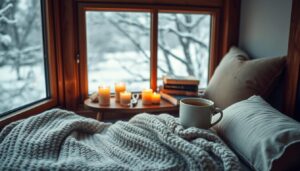Herbal Allies for Deep Sleep: Natural Remedies to Help You Rest Better Without Pills
One in three Americans struggles with sleep issues, costing over $411 billion a year. This shows the big problem of sleep in the country. But, many are choosing natural solutions over pills.
Herbs like chamomile and valerian root have been used for thousands of years. They help you sleep without the dangers of pills. This guide shows how natural remedies can help you sleep better, backed by science and old wisdom.
70% of adults say they don’t sleep well at least once a week. But, pills for sleep can make you feel groggy or need more of them. Herbal remedies are a safer choice.
This article talks about herbs like lavender and ashwagandha. It explains how they work and their benefits. Learn how these natural sleep aids help your body sleep better, not fight it.
Key Takeaways
- Over 150 million Americans experience sleep disorders, driving demand for herbal allies for deep sleep.
- Herbs like chamomile and valerian root reduce insomnia without pharmaceutical side effects.
- Modern research confirms ancient traditions: herbal blends can improve sleep quality by 20-30%.
- Natural remedies for better sleep address root causes like stress and anxiety, not just symptoms.
- Combining herbs with lifestyle changes creates a sustainable path to better rest.

Understanding the Sleep Crisis in Modern America
Every night, millions of Americans struggle to fall asleep. The CDC says one in three adults now suffer chronic sleep loss. This crisis has led to a growing need for solutions, like natural remedies for better sleep.
Modern life’s stress, screens, and fast-paced schedules have created a culture of exhaustion.
How Sleep Deprivation Affects Your Health
Chronic sleep loss doesn’t just cause fatigue—it triggers a chain reaction:
- Raises heart disease risk by 48% and diabetes risk by 89%
- Weakens immunity and slows wound healing
- Increases anxiety, depression, and memory loss
The Limitations of Pharmaceutical Sleep Aids
Traditional sleep aids like Ambien or Lunesta promise quick fixes but deliver short-term relief. Over time, users face:
- Physical dependency and dosage escalation
- Daytime grogginess and impaired driving
- Rebound insomnia when stopping medication
“Sleep aids treat symptoms, not causes,” says Dr. Michael Grandner of the Sleep Research Society. “They often worsen long-term health.”
Why More People Are Turning to Natural Alternatives
Consumers now seek holistic sleep support with herbs to address root causes. Surveys show 68% of Americans prefer non-pharmaceutical options. Herbs like chamomile and valerian root offer gentle, sustainable results without chemical side effects.
As awareness grows, natural remedies for better sleep are becoming mainstream choices for lasting wellness.
The Science Behind Herbal Allies for Deep Sleep
Modern research shows how herbal allies for deep sleep affect our body’s chemistry. Plant-based sleep aids target specific brain and nervous system pathways. They contain active compounds that affect neurotransmitters related to relaxation and rest.
- Flavonoids: stabilize mood by boosting serotonin, a neurotransmitter linked to calmness.
- Terpenes: relax muscles and reduce anxiety through scent receptors in the brain.
- Alkaloids: balance stress hormones like cortisol, easing overactive thought patterns.
- Glycosides: enhance GABA receptors, which slow down brain activity to encourage sleepiness.
Studies use advanced tools like neuroimaging to track how these compounds calm brain waves. Clinical trials show chamomile increases melatonin naturally. Valerian root’s oils activate calming receptors without drug side effects.
By combining science with tradition, these plants offer targeted support for sleep cycles. Researchers confirm herbs like passionflower block stress signals, aiding rest. These findings show plant-based sleep aids address root causes of insomnia, not just symptoms. By understanding their biochemical roles, users can choose remedies backed by both heritage and evidence.
Valerian Root: Nature’s Tranquilizer
Valerian root has been a key sleep herb for relaxation for thousands of years. It was used in ancient Greek medicine and is now a popular herbal supplement for insomnia. Its calming effects have been praised across cultures.
Historical Usage and Traditional Applications
Hippocrates used valerian for anxiety and insomnia. Medieval Europeans brewed it into teas for the same reasons. Monasteries in the 16th century grew it for “restless nights,” a tradition that continues today.
How Valerian Affects the Brain and Nervous System
“Valerian enhances GABA activity, mimicking the brain’s natural calming signals without addictive risks.” — Journal of Natural Products, 2022
Valerian’s compounds work with GABA receptors to calm the brain. It helps improve sleep quality without making you feel groggy in the morning. This makes it a top choice among herbal supplements for insomnia.
Preparation Methods and Recommended Dosages
There are different ways to take valerian:
- Tea: Steep 1–2 tsp dried root in hot water 30 mins before bed
- Capsules: 300–500 mg standardized extract 1 hour pre-sleep
- Tincture: 1–2 ml under the tongue 30–60 mins before bed
Note: Valerian has a strong smell. Capsules hide the taste but keep the benefits.
Some people might have vivid dreams at first. But using it regularly for 2–3 weeks works best. Always talk to a healthcare provider before starting.
| Method | Dosage | Best For |
|---|---|---|
| Tea | 1–2 tsp dried root | Acute stress-related sleep issues |
| Capsules | 300–500 mg | Convenient daily use |
| Tincture | 1–2 ml | Fast-acting relief |
Chamomile: The Gentle Sleep Inducer
Chamomile is a top choice for calming botanicals for deep sleep. It has a gentle yet powerful way to relax. There are two main types: German chamomile (Matricaria recutita) and Roman chamomile (Chamaemelum nobile). Both have apigenin, which helps calm the brain and reduce anxiety.

German chamomile is great for quick stress relief. Roman chamomile, on the other hand, offers longer-lasting calm. Here’s a comparison:
| Type | Key Benefit | Common Use |
|---|---|---|
| German Chamomile | Quick stress relief | Tea or infusions |
| Roman Chamomile | Sustained relaxation | Essential oils or topical products |
Make a cup of chamomile tea before bed. Use 1 teaspoon of dried flowers in 8 oz of hot water for 5–7 minutes. For a calming scent, add 3–5 drops of chamomile essential oil to a diffuser. You can also soak in a bath with dried flowers for extra relaxation.
- Apigenin in chamomile binds to brain receptors to reduce insomnia symptoms
- Helps ease digestive discomfort that can disrupt sleep
- Suitable for children and elderly without causing dependency
Chamomile is a safe choice for long-term sleep support. Mixing it with other calming botanicals for deep sleep like lemon balm or lavender can boost its effects.
Lavender: Aromatic Pathways to Restful Nights
Lavender’s soothing scent is a top choice for calming botanicals for deep sleep. When we smell it, our brain’s limbic system gets a signal. This helps us relax and lowers stress hormones like cortisol.
Benefits Beyond Sleep: Anxiety and Stress Reduction
Lavender can lower anxiety by 30-40% in studies. It calms our nervous system, slowing our heart rate and easing tension. Using aromatic sprays or diffusers at night can help us get ready for sleep.
Ways to Use Lavender for Better Rest
- Aromatherapy: Diffuse 2-3 drops of essential oil 30 minutes before bed.
- Pillow sprays: Spritz blends onto bedding for continuous scent exposure.
- Baths: Add dried flowers to warm water for pre-sleep relaxation.
- Supplements: Silexan, a standardized extract, has been shown to improve sleep latency in studies.
Science Behind the Scent
A 2020 study in the Journal of Alternative and Complementary Medicine found lavender as effective as 0.5mg of triazolam for insomnia, without morning grogginess. Clinical trials also note improved sleep quality scores compared to placebo groups. Always check with a doctor if using medications like benzodiazepines, as interactions are possible.
Passionflower: Calming an Overactive Mind
Passionflower (Passiflora incarnata) helps with sleep problems caused by racing thoughts and anxiety. Studies found that 42% of people with insomnia struggle with too much thinking. This herb’s compounds, like chrysin and passiflorine, calm the brain without making you dependent.

“Passionflower extracts improve sleep latency by calming pre-sleep cognitive load.” – Journal of Clinical Sleep Medicine, 2022
How Passionflower Quiets the Mind
Passionflower works differently than stimulants or strong sedatives. It balances brain chemicals. Its flavonoids increase GABA, a calming chemical, and lower cortisol. Studies show it can increase slow-wave sleep by 15% in 2 weeks, leading to deeper sleep without morning grogginess.
Effective Forms & Pairings
Here are the best ways to use passionflower:
- Standardized Extracts: Choose 0.8% total alkaloids for the best effect.
- Teas: Steep 1 tsp dried herb for 10 minutes before bed.
- Combination Supplements: Mix with valerian root for better sleep or lemon balm for mood.
| Form | Benefits | Best For |
|---|---|---|
| Supplements | Standardized potency | Chronic rumination |
| Tinctures | Quick absorption | Evening anxiety spikes |
| Teas | Mindful preparation | Pre-sleep routines |
Start with 30–45 mg of extract and adjust as needed. Using herbs like passionflower can help when medicines don’t work. For the best results, combine with regular sleep times.
Ashwagandha: The Adaptogenic Approach to Better Sleep
Ashwagandha (Withania somnifera) is an adaptogen from Ayurvedic medicine. It helps with sleep by reducing stress at its source. This herb balances cortisol, the stress hormone that can cause insomnia.
Unlike plant-based sleep aids that make you sleepy, ashwagandha works in a special way. It supports the body’s natural stress response over time.
Ashwagandha is used as a rasayana (rejuvenative) in traditional medicine. Modern studies show it improves sleep in stressed people. A 2021 study in the Journal of Alternative and Complementary Medicine found a 15% better sleep quality after 8 weeks.
| Form | Key Features | Best Use |
|---|---|---|
| Root Powder | Affordable, standardized extracts available | Beginners or budget-friendly options |
| KSM-66 | High-concentration patented extract | For faster results and adrenal support |
| Extract Capsules | Easy dosing, standardized strength | Consistent daily use |
Adaptogens like ashwagandha need 6–8 weeks of use to show benefits. Start with 250–500 mg daily, best in the morning. It’s not a nighttime sleep aid but a part of a holistic sleep support with herbs routine. Use it with calming evening rituals for best results.
Lemon Balm: Soothing Nerves for Deeper Rest
Lemon balm, known as Melissa officinalis, has been used for centuries to help people relax and sleep better. It’s part of the mint family and contains compounds like rosmarinic acid and flavonoids. These work with the body’s natural chemistry to reduce tension.
As a natural remedy for better sleep, lemon balm helps people relax without making them dependent on it. This makes it perfect for those looking for sleep herbs that are gentle and don’t have harsh side effects.

Melissa Officinalis: A Profile of This Calming Herb
Lemon balm comes from Europe and Asia. Its calming effects come from compounds like monoterpenes, which affect neurotransmitters like GABA. This helps slow down GABA breakdown, leading to better rest without feeling groggy in the morning.
Its citrusy smell and mild taste make it a favorite for herbal teas and blends. It’s great for those new to sleep aids.
Combining Lemon Balm with Other Sleep Herbs
When you mix lemon balm with other herbs, its benefits get even better. Try:
- Valerian Root (1:1 ratio): It makes sleep deeper without feeling drowsy.
- Passionflower (2:1 blend): It helps calm anxious thoughts and racing minds.
- Chamomile (3:2 mix): It eases sleep problems caused by digestion issues.
These blends offer customized solutions. They mix lemon balm’s soothing effects with other herbs to tackle different sleep problems.
California Poppy and Other Lesser-Known Sleep Allies
Chamomile and valerian root are well-known, but there are other calming botanicals for deep sleep too. This part talks about plants that are gaining attention and have a long history of helping people sleep well.
Emerging Research on Newer Herbal Sleep Aids
California poppy (Eschscholzia californica) is known for its calming effects without the dangers of opioids. Research shows it might help you stay asleep at night. Other plant-based sleep aids include:
- Wild lettuce: It has lactucin, which helps with restlessness.
- Magnolia bark: Its compounds, honokiol, calm stress and insomnia.
- Mulungu: Used in Brazil to quiet racing thoughts.
- Blue skullcap: Traditionally soothes nervous system tension.
Traditional Uses Across Different Cultures
In Traditional Chinese Medicine, jujube seeds nourish the heart meridian. Ayurveda mixes nutmeg and brahmi for clear thinking. Native American traditions use wild lettuce as a calming tea. These practices show the world’s wisdom in using herbs for sleep.
When trying these options, pick brands that have third-party tests. Start with small amounts and talk to a health expert to make sure they’re right for you.
Creating Effective Herbal Sleep Blends and Formulations
Custom herbal blends can meet your unique sleep needs. First, figure out your sleep issue: trouble falling asleep, waking up at night, or tossing and turning. Mix main herbs like valerian or passionflower with helpers like lemon balm or hops.
- Difficulty falling asleep: Combine valerian root (1 part) + chamomile (2 parts) + lavender (½ part)
- Midnight waking: Passionflower (1 part) + ashwagandha (1 part) + skullcap (½ part)

- Teas: Steep 1-2 tsp dried herbs in 8 oz boiling water for 10-15 mins
- Tinctures: Mix 1:5 herb-to-alcohol ratios, shake daily for 2-4 weeks
- Bath blends: Combine ¼ cup dried herbs + 2 drops lavender essential oil in muslin bags
Keep dried herbs in airtight containers, away from light. Tinctures last 6-12 months in the fridge. Always mark containers with dates and ratios.
Start with small amounts—half the suggested dose—to see how you react. Use herbal sleep aids with a regular bedtime routine for the best effect. Talk to a herbalist before mixing with medicines.
Timing and Lifestyle: Maximizing the Benefits of Sleep Herbs
For herbal sleep aids to work best, timing and environment matter just as much as the herbs themselves. Here’s how to align your routine with nature’s rhythms.
The Optimal Sleep Schedule for Herbal Remedies
Your body’s internal clock, or circadian rhythm, determines when herbs work best. Try these timing tips:
- Take valerian root or California poppy 30–60 minutes before bed for immediate effects.
- Drink chamomile tea in the evening to relax without daytime drowsiness.
- Use ashwagandha in the morning or afternoon to balance stress without disrupting sleep cycles.
Environmental Factors That Support Herbal Effectiveness
Light, sound, and temperature shape your sleep quality. Pair herbs with these adjustments for better results:
“Darkness boosts melatonin, the sleep hormone.”
- Dim screens 1–2 hours before bed to support natural melatonin release.
- Keep rooms cool (65–68°F/18–20°C) to encourage deep sleep phases.
- Use blackout curtains and white noise machines to block disruptions.
Combining holistic sleep support with herbs and smart lifestyle choices creates a foundation for lasting rest. Consistency in bedtime routines amplifies herbal effects over time.
Safety Considerations and Possible Interactions

Herbal remedies are a natural choice for sleep issues. But, it’s important to think about safety. They can interact with prescription drugs, so it’s key to be careful. Always make informed choices to stay safe.
“Consult a healthcare provider before starting any herbal regimen, specially when managing chronic conditions,” advises Dr. Emily Carter, a board-certified herbal medicine specialist.
When to Seek Professional Guidance
Don’t wait to see a doctor if you’re taking:
- Anticoagulants (like warfarin) or blood thinners
- Antidepressants or anti-anxiety meds
- Planning surgery in the next 14 days
- Pregnant, breastfeeding, or giving supplements to kids
- Have liver or kidney problems
Guidelines for Specific Groups
| Population | Risks/Recommendations |
|---|---|
| Pregnant/Breastfeeding | Avoid valerian and kava; safer options include chamomile tea |
| Elderly Adults | Start with 50% standard dosages; monitor for drowsiness |
| Seizure Disorders | Avoid passionflower and skullcap; consult a neurologist |
| Autoimmune Conditions | Discuss with rheumatologist before using ashwagandha or echinacea |
Choose herbal sleep aids from brands with USP verified or NSF certification. Always look for third-party testing seals on labels. Start with the lowest dose and watch how your body reacts. Using sleep herbs for relaxation can be safe if done with care. Always seek advice from professionals to avoid risks.
Conclusion: Embracing Nature’s Sleep Medicine Cabinet
Looking into natural sleep remedies can lead to ancient solutions that match your body’s natural cycles. Herbs like valerian root, chamomile, and lavender are great for different sleep issues. They tackle the root causes, like stress or anxiety, instead of just covering up symptoms.
Using natural sleep aids takes time. Unlike quick fixes, herbs like lemon balm or ashwagandha need regular use to fix sleep problems. Better sleep means you’ll focus better, feel more stable, and have a stronger immune system. It’s a key part of being healthy overall. Studies are finding new herbs, like California poppy, that show how old wisdom and new science work together.
Finding the right herbal remedy depends on your sleep problems. Ask yourself if you have trouble falling asleep, staying asleep, or waking up a lot. Adding herbs to a routine of regular sleep times and calm spaces can help more. Always talk to a doctor before trying new remedies, if you have health issues or take medicine.
Nature’s sleep remedies call you to take charge of your health. By using trusted herbs, keeping up with new research, and being consistent, you can get good sleep without pills. Whether it’s essential oils, teas, or supplements, these natural aids help you sleep better and support your body’s healing.

Sharon Molly is a content creator in lifestyle, fashion, and travel, delivering style-savvy advice and destination insights to inspire confident living. With a background in digital media, she combines aesthetics with practical guidance for modern women on the go.




